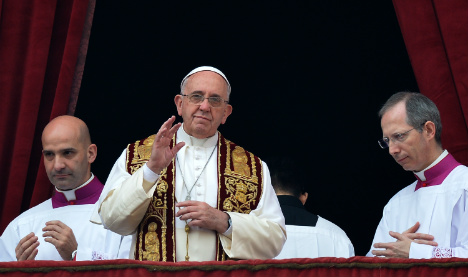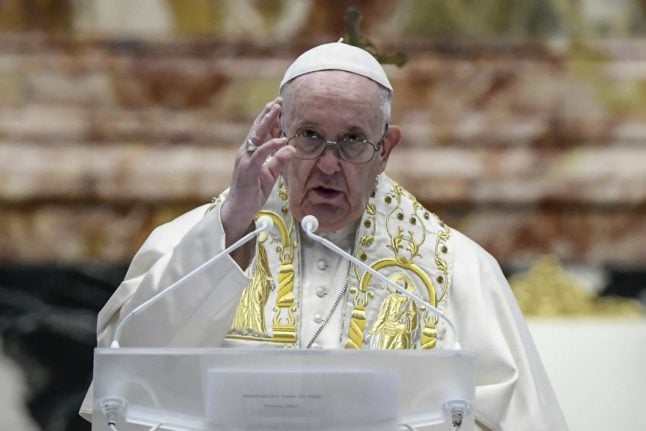Speaking to a packed crowd outside Saint Peter's Basilica, the popular Argentine pontiff also made a strong call to end violence wrought against children amid "indifference and tears."
His second traditional "urbi et orbi" message (to the city and to the world) comes at the close of a year plagued by war and violent religious fundamentalism, notably in Iraq, Syria, Nigeria and most recently against school-children in Pakistan.
"Truly there are so many tears this Christmas," he said in the message broadcast across the world.
Without naming the jihadist Islamic State (IS) group, he said Christians in Iraq and Syria "for too long now have suffered the effects of ongoing conflict" and "together with those belonging to other ethnic and religious groups, are suffering a brutal persecution."
There were "too many displaced persons, exiles and refugees, adults and elderly, from this region and the whole world."
Killings and hostage-takings from the Middle East to Nigeria and elsewhere must stop, he said.
Visibly moved and departing from his text, the 78-year-old head of the Roman Catholic church noted "the children massacred by bombardments, including where the son of God was born" — in the Holy Land — and their "powerless silence that cries under the sword."
Denouncing "indifference", he explicitly condemned abortion, deploring the children "killed before seeing the light".
"May Jesus save the vast numbers of children who are victims of violence, made objects of trade and trafficking, or forced to become soldiers."
"May he give comfort to the families of the children killed in Pakistan last week", he added, referring to the 149 people, including 133 school-children, killed in Peshawar by the Taliban.
In Baghdad, where an estimated 150,000 Iraqi Christians have fled jihadist violence since June, Christmas celebrations were dampened by events.
"We do not have any feelings of joy," said Rayan Dania Sabri at Baghdad's Church of the Ascension. "How can we be joyful when there are thousands still living in camps and schools in poor conditions?"
Turning to trouble-spots elsewhere across the globe, the softly-spoken Francis urged Ukrainians also to "overcome tensions, conquer hatred and violence and set out on a new journey of fraternity and reconciliation".
He called for peace in "the whole Middle East" and continued efforts towards "dialogue" between Israelis and Palestinians.
Peace too was essential in Africa, particularly in Nigeria "where more blood is being shed", as well as in Libya, South Sudan, the Central African Republic and the Democratic Republic of the Congo.
He noted the victims of Ebola in Liberia, Sierra Leone and Guinea and thanked those who were "courageously" assisting the sick.
Britain's Queen Elizabeth II also was expected to pay tribute to the "selflessness" of medical staff and aid workers fighting the Ebola epidemic in her own annual Christmas Day broadcast.
In Sierra Leone, all public Christmas festivities were cancelled as a result of the Ebola crisis, with soldiers deployed over the holiday season to prevent spontaneous street celebrations, officials said.
In his Christmas message, which was fairly brief, the pontiff traditionally calls for remedies to the world's woes.
Francis however has put an end to a longstanding tradition of popes wishing a happy Christmas in dozens of languages.
At a Christmas Eve mass, he urged Roman Catholics to have greater empathy towards family and friends, saying the world needs "tenderness" and "warmth".
In Syria, Christians in the war-torn city of Homs were enjoying their first Christmas in three years in the Hamidiyeh neighbourhood, with a brightly coloured tree and a manger made from rubble set up in the middle of the ruins.
Francis sent a video message to South Koreans recalling his trip to the country in August in which he said: "The great celebration in honour of the (Catholic) martyrs (in the 18th and 19th centuries in Korea), and the encounters with young people remain fresh in my memory."
Cubans prepared to celebrate Christmas, a resurgent holiday banned for 38 years by the communist government, with an early gift from US President Barack Obama: a historic rapprochement.
In Bethlehem on Christmas Eve hectic preparations preceded celebrations on the West Bank town's biggest night of the year, culminating in midnight mass at the Church of the Nativity built over the spot where Christians believe the Virgin Mary gave birth to Jesus.
Scouts playing bagpipes and drums marched to the church in a procession led by Jerusalem's Latin Patriarch Fouad Twal, the top Catholic cleric in the Holy Land.
In his homily, Twal called for "peace in Jerusalem", where violent clashes between Israelis and Palestinians rocked the city for months, and "equality and mutual respect" among all faiths.
He also asked for the rebuilding of Gaza, which was ravaged this summer during a 50-day war between Hamas and Israel in which more than 2,200 people died.




 Please whitelist us to continue reading.
Please whitelist us to continue reading.
Member comments